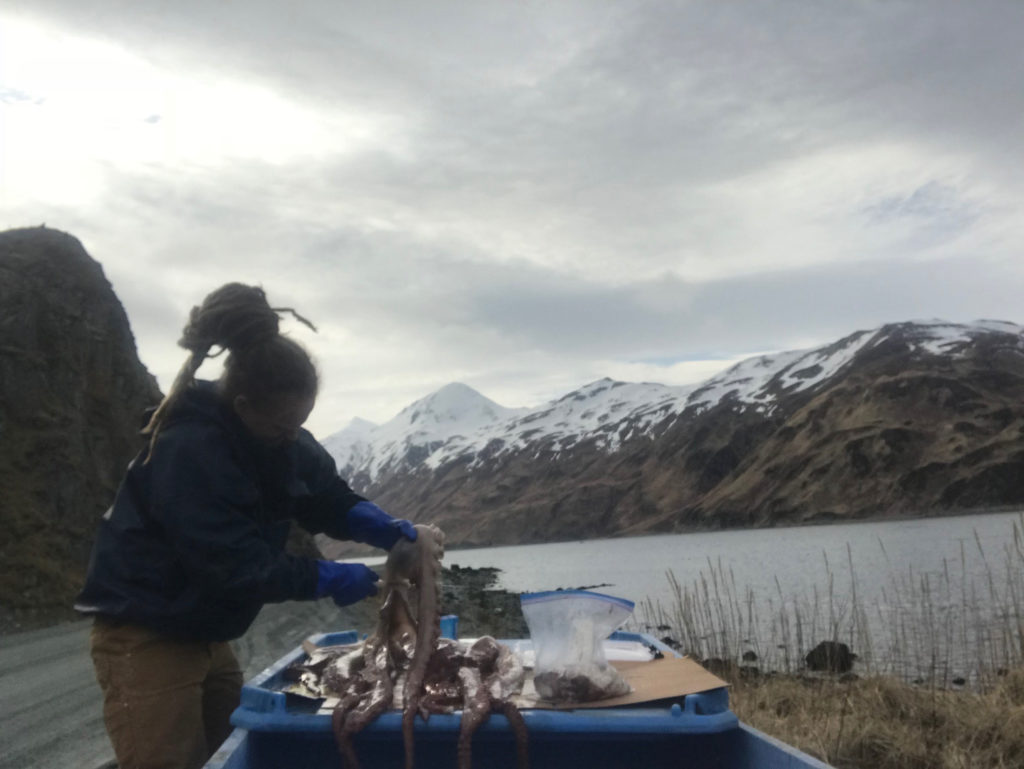
It read: “A fisherman here has a tote full of octopus for you. I don’t have time to work them up. What would you like us to do?”
After a quick discussion with FAST lab director Dr. Brad Harris, faculty member Dr. Nathan Wolf, and lab manager Sarah Webster, it was decided that Jevons would get on the next plane to Dutch Harbor. By 2pm that afternoon, Jevons was at Ted Stevens airport, on his first ever trip to the Aleutian Islands.
This spontaneous trip wasn’t just an adventurous whim – it was for the sake of scientific data collection. Giant Pacific octopus (Enteroctopus dofleini) are incidentally caught in commercial, recreational, and subsistence fisheries in Alaska. Not much is known on their diet except for limited information from midden analyses (middens being piles of debris left behind by octopus next to their dens, containing fragments of their prey such as bones, shells, and other hard body parts). While middens do provide useful information, data can be misleading due to displacement from water movement and missing evidence of soft-bodied prey. This lack of information contributes to giant Pacific octopus’s status as a “data-poor species” for fisheries managers. Jevons thesis involves stable isotope analyses of great Pacific octopus tissue (muscle, skin, and beak) in order to develop a more comprehensive understanding of their diet.
When Jevons arrived in Dutch Harbor, he realized he had no idea of where to go to find the tote full of octopus. His cell phone carrier did not have service in Dutch Harbor.
“So I rented a truck and literally just started driving around,” he said, “it was like a time warp back to the ‘90s!”
Given that he arrived late on a Friday, many places were closed. He first went to Alyeska Seafoods and spoke with an employee there that pointed him in the direction of a box of octopus beaks that were waiting for him. These beaks were from Dustan Dickerson, the manager of a brand new octopus processing facility in Unalaska (http://www.thedutchharborfisherman.com/article/1804unalaska_approves_octopus_plant). Dickerson was also graciously saving octopus for Jevons, so his impromptu trip allowed for these octopus to be sampled as well.
But Jevons still hadn’t found what he had originally come for – a tote full of octopus. He asked a foreman named Joon at Alyeska Seafoods where Westward Seafoods was – that was where he would find his octopus.
“Turn left at the bridge,” Joon told him. Ben used his “rinky-dink” hotel map to try to figure out where said bridge was, and eventually found Westward Seafoods, where lo and behold, there was a tote with a note attached: “Octopus – 510 lbs. – for Ben Jevons.”
Melissa Good came down and that evening they managed to get through all 510 lbs. of octopus at the Sea Grant facility in Dutch Harbor, so that Ben could later analyze the samples.
“It’s great – I was wanting to sample about 30-40 octopus; I just didn’t expect to get them all at once!” Ben said.
Dr. Brad Harris, the director of the FAST Lab, expressed a tremendous amount of gratitude towards these collaborative partnerships within the fishing industry.
“We would not be able to do the research that we do without their help, their expertise, and their enthusiasm for our work,” Harris said. “Because of our partnership and the industry’s willingness to reach out to us, we are able to get the data we need to answer important questions about Alaskan fisheries.”
